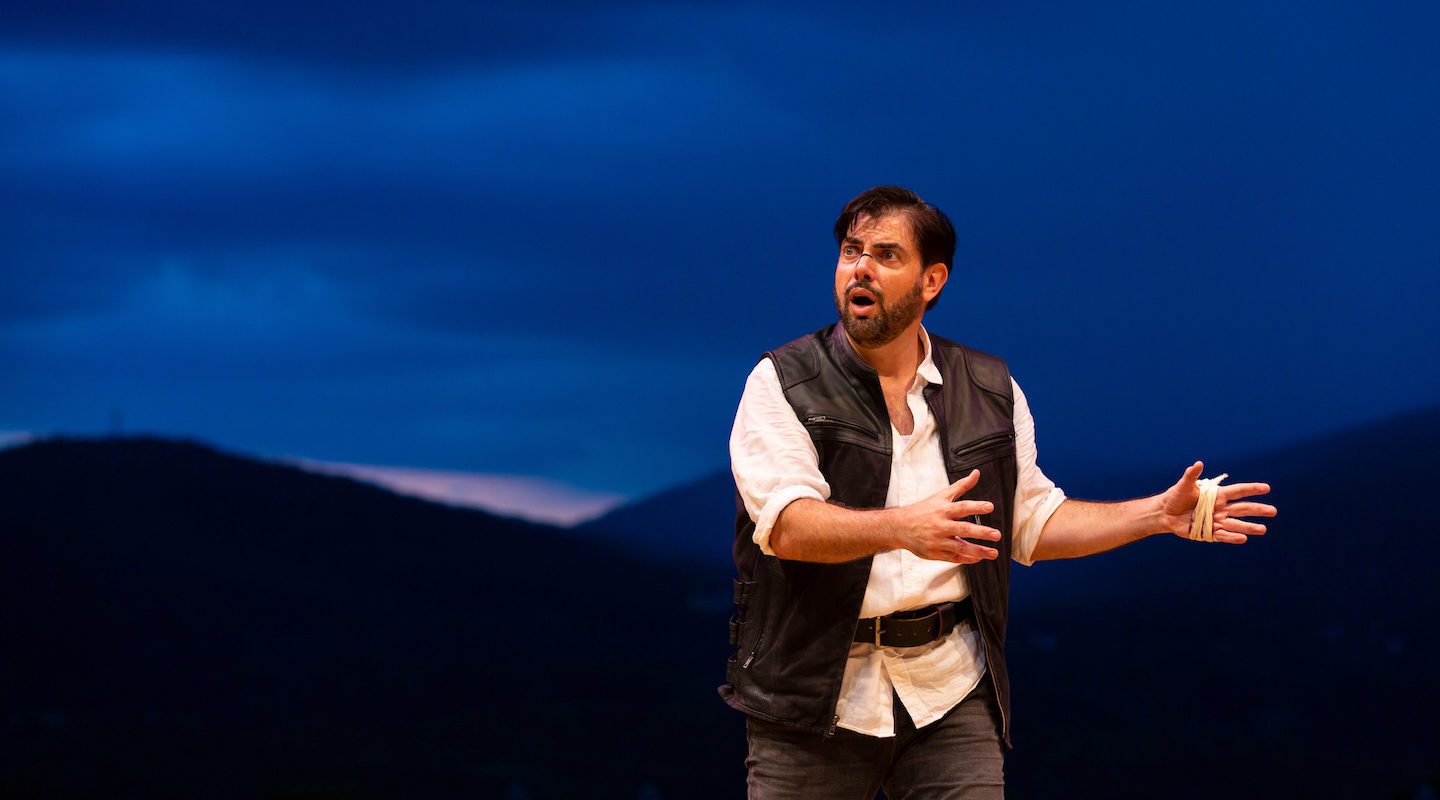Posted August 2, 2019
Originally published on August 1, 2019 by Frances Marion Platt in Hudson Valley One (“Hudson Valley Shakespeare delivers zesty five-actor Cyrano“).
Now in his tenth summer as a regular at the Hudson Valley Shakespeare (HVSF), Jason O’Connell is an actor of many gifts who shines with especial brilliance when cast in a comic role. Both verbal and physical comedy are his strong suits, as was evidenced in his lead performance at HVSF in 2014 as Dorante in Corneille’s 17th century farce The Liar — the role that first placed him squarely on Almanac Weekly’s radar as someone whose career going forward would demand close attention. O’Connell does standup comedy, too, and wrote a funny autobiographical one-man play about his childhood obsession with Batman, The Dork Knight, which he has performed at Bannerman’s Castle, the Public Theater and a bunch of other venues.
But putting talented actors in little boxes and expecting them to stay there is a bad idea. O’Connell clearly wants to do other things besides be uproariously funny, and HVSF, cognizant of his talent, has been giving him a longer leash the past several years. In 2017 he dialed his goofiness way down to play an iconic romantic lead role in the tent at Boscobel: Mr. Darcy in Kate Hamill’s stage adaptation of Jane Austen’s Pride and Prejudice. This was a Darcy with a few funny moments, true, mocking the character’s propensity for stuffy self-importance before breaking down to confess his helpless adoration for Lizzy Bennett; but it was plain that, to expand his acting range, O’Connell was feeling a need to work on his restraint. He did well. One can be nuanced and funny at the same time.
This season at HVSF, the actor is taking this exercise a step further in assaying the role of a tragic romantic hero — an icon who has been portrayed in the past by such luminaries as José Ferrer, Ralph Richardson, Len Cariou, Richard Chamberlain, Derek Jacobi, Christopher Plummer, Kevin Kline and, in a comedic movie version (Roxanne), Steve Martin. Not only is O’Connell playing Cyrano de Bergerac, but he also co-authored, with Brenda Withers, a streamlined, slightly modernized adaptation of the 1897 Edmund Rostand classic. Their new Cyrano is rejiggered to be manageable by only five actors, with several minor characters eliminated or combined. Count de Guiche, for instance, is wooing Roxane on his own behalf, making Valvert disposable; the actor Montfleury replaces him as the victim of Cyrano’s scathing wit and dueling skill in the first act.
Cyrano de Bergerac is not a comic character by any stretch, but he still gets all the best lines, because lacerating fools with satire is what he does when he isn’t slicing and dicing them with his sword. It’s an excellent choice of role for O’Connell to demonstrate a broader emotional skillset. We believe him as thoroughly when his heart is breaking as when he is slinging witticisms. In this version, Cyrano’s most boastworthy deeds happen offstage — the one-man fight against 100 footpads, the daily sneaking across enemy lines to deliver love letters — but his heroism on the microcosmic scale, when he swallows his passion for Roxane to facilitate her marriage to Christian, is all the more powerful for its understatement.
So it’s no surprise that O’Connell delivers, but the rest of the cast is terrific as well: Britney Simpson as a very sassy Roxane, Luis Quintero playing Christian as an ultimately sympathetic doofus and Nance Williamson and George Merrick in all the other roles. As usual, Williamson sails between male and female parts with ease, here mainly portraying Cyrano’s comrade (and in real life, his biographer) La Bret. Merrick makes great use of several different opportunities to be the funniest guy onstage, as a pretentious Montfleury, a well-meaning-but-klutzy Ragueneau and a scheming de Guiche. Director Meredith McDonough pulls all the components together with a crackling pace and plenty of, dare we say, panache.
Speaking of the historical Cyrano de Bergerac, it would appear from current scholarship that he was probably gay, probably not a Gascon at all but a Parisian, had a great-great-grandfather who was burned at the stake for putting up posters making fun of the Roman Catholic dogma of transubstantiation and — most surprising of all — wrote what is probably the earliest science fiction story involving someone traveling to the Moon using rockets (well, a large quantity of firecrackers). Maybe his unrequited love for his spirited, beautiful, intellectual cousin wasn’t really the driving force in his life; but we should be grateful that his existence inspired so many different iterations on stage and screen, attracting the interest of so many fine actors.

